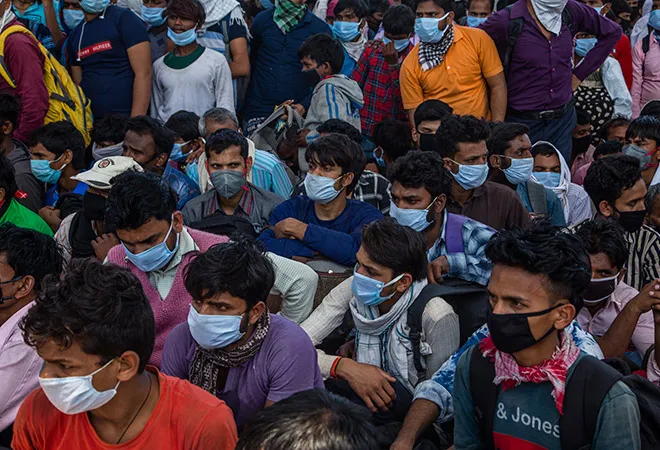
(Universal basic insurance cover, linked to Aadhaar)
A group of officials at GoI, are working proactively with few insurance companies and the state control rooms, to reach out to the families of the Covid victims, to ensure immediate payment of insurance proceeds. And the realisation has occurred that most of the victims have not been insured and if insured, then the families’ are not aware that the victim was insured, nor do they have the ability to trace the policy documents. It reiterates that the financial literacy is still low, despite the efforts of the regulator over the years; and that the concept of insurance is still left to chance and is not a planned event in the lives of most Indians. India has one of the lowest life insurance & health insurance cover penetration in the world.
Employee State Insurance (ESI) Act of 1948 offers social security benefits including medical benefit, sick & disability and benefits. The ESI Act applies to organisations where 10 or more persons are employed and employees drawing salary upto ₹ 21,000 are mandatorily covered under the act. Under the Act eligible employees contribute 1.75% of their salary (basic + allowances) and employers contribute 4.75% to the ESI corpus every month. At present, the corporation has a base of 3.43 crore insured persons, commonly referred as subscribers.
Not surprisingly, ESI has just over 150 hospitals and 1500 dispensaries across the country. Until a major health crisis hit the economy, the need for spending higher federal budgets for it did not arise. There is a dire need to upgrade the ESI dispensary & hospitals, both in terms of infrastructure as well as service quality & manpower head count. ESI also needs to increase number of its hospitals and / or mandate private hospitals to take certain proportion of ESI subscriber-patients with government reimbursing the costs to those hospitals. It will remain a challenged- vision for ESI to expect non-ESI patients to use their facilities, given how woeful the quality infra is.
We have had and continue to have challenges around mis-selling of insurance products and despite regulatory watch, many get away with “insurance products being sold as investments”. Globally successful large insurance companies sell/advise insurance policies as a “protection” product. It is time we take a leaf from it and develop a plan to protect our large population. Also, one of the expensive distribution of insurance products is the basis of the popular channel called “Banca”, which is insurance company selling the products to the customers of a bank. This precludes much of product-feature-choices available to the consumers and it does not necessarily go down to the smaller geographies or low-income customer base.
The real economic data would show that the cost of health care services has been increasing; and sentimentally, the vast middle class & EWS population feel that there is no value to an Indian life. However, demonstration of political will to fight Covid19 and to save every life proves this to be a wrong sentiment and this crisis can be used for the larger public good. With the structure of our insurance industry and the existing strong contours of Adhaar card and its digital backbone, it is time to convert the current gaps towards universal health insurance and life insurance cover. Covid-moment is a good time to think of “Universal basic insurance cover, for every Indian”.
It is possible to offer a mandatory basic insurance (both health and life cover) to every Indian, linked to their Adhaar card. For those in employment, a mandatory premium deduction can be made at the monthly pay-roll level, like an ESI or EPF contribution is deducted. For those who are self-employed, there can be a mandatory, monthly/annual contribution that can be made by them (almost like personal income tax). For those in ESI bracket, it is already provided for. For those who are not covered in any of above, there can be a federal budgetary provision to fund an annual insurance cover premium.
The companies who run their payroll must be allowed to choose their own insurance provider who would underwrite such a policy, without forcing them to go only to LIC or specific providers. This would allow the industry to gain reinsurance cover for the Indian lives and health care costs.; with Adhaar linkage, the operational and cost efficiency of policy underwriting, processing and claims settlement can be done using Digi-Locker as a storage medium. And our federal health costs can be reinsured to an extent if such a universal insurance can be structured as a good policy and executed efficiently.
The views expressed above belong to the author(s). ORF research and analyses now available on Telegram! Click here to access our curated content — blogs, longforms and interviews.




 PREV
PREV

